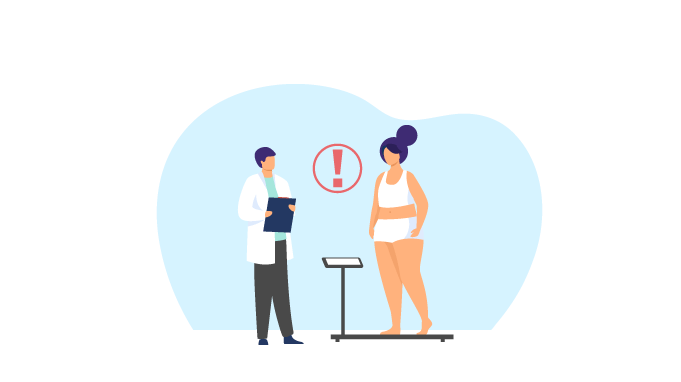Obesity in the Workplace - How to Deal with it?
Welcome to the realm of the heavy world. Yes, you read that correctly. The majority of people in today's globe have gained weight. Inactivity, stress, and eating unhealthy meals, to name a few factors, all contribute to gaining that extra pound every minute.
But when this weight gain leads to medical conditions like obesity, health risks arise. And once obesity takes hold, the battle is on.
Now, with work from home being the new cool, we're all operating from the comfort of our own homes. Eat, work, sleep, and repeat is the new mantra.
Also, working hours have constantly increased along with our weight because of the messed up remote working schedule. And, when at home, we cannot help but hog on every food we get our hands-on, not to mention the food delivery apps.
So, it won’t be surprising for employers to find their employees putting on a little weight when they go back to work.
However, now when offices are reopening, employers may assist their employees in combating obesity in the workplace.
But first, Let’s find out…..
What is Obesity?

Now, many of you might be confused between the terms overweight and obesity. Despite their striking resemblance, they are not the same.
In simple terms, obesity and overweight refer to the accumulation of body fat above what is considered healthy. Both terms denote excessive bodily fat; however, an obese individual will have significantly more fat than an overweight one.
I agree that fat is required for energy and other uses. Like for a man, 2-5% fat is healthy and for women it is 10-13%. But anything beyond these can give rise to overweight and obesity down the line.
Obesity can lead to potential health risks such as Type 2 diabetes and heart disease, among other things.
Obesity affects about one-third of the overweight population in the United States.
Causes of Obesity
Obesity is one of the world's most pressing issues today. It's a persistent chronic medical condition that's more than just an aesthetic issue. Obesity is more prone to emerge when we consume more calories than we expend and consume too much unhealthy food.
Obesity is defined as a Body Mass Index of 30 or above in adults aged 35 and up.
Let's have a look at a few additional reasons for obesity:
1. Poor Eating Habits
Our diet is heavily laden with high-calorie foods and sugary beverages. Pizza, burgers, french fries are all good in the matter of taste but are equally harmful to health.

While eating fast food is fine from time to time, continuous consumption of such food can take one on frequent visits to the doctor’s clinic.
Especially amidst busy schedules, employees half of the time do not pack lunch from home. They would rather eat at fast-food restaurants or order online, which is one of the most unhealthy eating routine.
2. Physical Inactivity
To achieve our fitness goals, physical activity should be induced in our daily routine.

When we allow lethargy and exhaustion to take hold of us, we open the door to a slew of ailments. Lack of physical activity can leave us feeling exhausted all the time, which can exacerbate stress and anxiety issues.
On the other hand, our bodies remain completely charged if we stick to a regular schedule of going for walks, running, or doing light workouts. Along with minimizing the chance of getting diseases, productivity rises.
3. Sedentary Lifestyle
The lives most of us lead are stationary with our work being pretty much desk-bound. And this sedentary lifestyle is closely proportional to obesity.
Maintaining a healthy lifestyle is not on our priority list. Right from working late hours in front of the computer, driving instead of walking, and binge-watching until dawn, the schedule is messed up from all sides.

Sedentary behavior depletes one's healthy weight and puts their health in jeopardy.
4. Family History

How much role do genes play in determining our weight? Pretty less, but they do.
According to some research, children with obese parents are 80 percent more likely to be obese themselves.
However, this link between genes and weight is extremely unusual. In fact, what matters more is the family environment. We will likely become overweight if our parents have passed on the obesity gene to us.
But we can avoid this risk by incorporating a healthy diet and exercise into our daily routine.
5. Emotional Overeating
Have you heard of the term “emotional overeating”? I bet you did.
There is a flood of emotions within us at times. Especially in the case of stress, anger, depression - all negative emotions flow in together. Given the pressures of our daily lives, this is a rather regular occurrence.
Many of us turn to food to help us cope with our unpleasant feelings in times like this.
Furthermore, this food intake may exceed the range of typical eating. And that is what we call emotional overeating. Also, as we all know, overeating leads to obesity and thwarts our weight-loss efforts.
Obese people may consume more calories before feeling satiated, experience hunger sooner, or eat more as a result of stress or anxiety.
Obesity Prevention for Adults
Obesity during childhood is somewhat easier to control for kids in their growing age. But when we reach our 30s, it gets difficult.
There are certain levels of control we have to develop as adults to prevent obesity. And as they say, ‘Prevention is better than cure.
Here are a few tips which can prevent all of us from developing health risks like obesity:
1. Eat Healthy fat instead of Unhealthy one
It may come as a surprise, but not all fat is bad. Fat is an essential component of our diet. We simply need to distinguish between good and bad fat.
Foods high in unsaturated fat, also known as polyunsaturated and monounsaturated fat, reduce the risk of diseases.
Good fat sources include fish, nuts, and seeds, among other things. Now coming to unhealthy fat, we should limit our intake.
Unhealthy fat, also known as trans fat, refers to processed foods that pose health risks even when consumed in small amounts.
So choosing your diet based on fat type would be a wise choice to avoid falling sick.
2. Consume more Fruits and Vegetables
A healthy diet for an adult includes five to nine servings of fruits and vegetables per day. Veggies and fruits help us consume fewer calories. As a result, we don't have to be concerned about gaining weight.
Besides, fill your diet with fiber and keep your glycemic index lower as it can keep your blood sugar levels normal.
You are not at risk of overeating as long as your diet is in order. Moreover, you can keep a track of your food intake and maintain a health diary with the help of Vantage Fit's nutrition tracker.
Weight loss is more common in people who eat more in the morning and less at night.
3. Get some Assistance
Following a healthy routine is tough when there is no one to motivate you. It is usually better to involve more people when you decide to embrace a healthy lifestyle.
For example, you could invite your coworker to join you on walks during breaks or to do some physical activities with you. The fun and fitness drive is preserved in this manner.
The same can be done by involving family members. Allow them to join you in some physical activity. And, as previously said, the more the amount of physical activity, the lesser the chances of obesity.
4. Try to reduce Stress
I know it's easy to say, but stress reduction is beyond our control. Most of us are doomed with anxiety issues these days. Most significantly, in a world of deadlines, we are forever in the clutches of panic attacks and workplace stress.
Calming our minds appears to be a near-impossible task. And stress stirs a brain reaction that leads to changes in our eating patterns. As a result, our desires for high-calorie foods intensify, and we can't help but eat every food in sight.
Now, do you notice the link between high-calorie foods and obesity?
Therefore, we should strive to be less stressed and maintain a cheerful attitude at all times.
5. Prepare Meals for Yourself
Knowing what we know today, it is always best to cook our meals ourselves when we wish to stick to a suitable diet regimen. Because it forces us to take responsibility for our actions.
Even though we are tempted by harmful foods in such circumstances, we will manage to reject them since we are accountable for our own health.
So, wake up, exercise, get ready, prepare a healthy lunch, and go to work.
How does Obesity affect the Workplace?
Obesity, as we all know, can lead to heart disease, diabetes, and even cancer, among other health problems. And these aren't conditions to be taken lightly. They are both dangerous and costly, and almost always result in death.
Obesity's workplace implications are now terrifying for everyone. Employees who are obese might have a significant impact on the company's overall health.
If you are an employer, you should know about the wide range of ooccupational implications. Because addressing obesity in the workplace would not be a cakewalk.
You should thoroughly research the challenges and consequences of obesity before coming up with remedies.
1. Absenteeism
One problem: How do you fight obesity at work if your obese employees don't show up?
This goes without saying that when we fall sick, we skip work. And obesity implies sickness, since it develops serious health issues.
So, when your employees are obese, they are likely to visit the doctor's office frequently or sulk at home due to lethargy or exhaustion. This ultimately leads to sick leaves being applied often.
And when there is no one working, work too becomes stagnant.
2. Presenteeism
With absenteeism, it is simple - employees just take leaves and stay at home. What's worse is when your staff show up to work and aren't productive.
This frequently occurs when an employee is ill but still comes to work. They struggle with their work in these situations since they are unable to perform correctly owing to illness.
The organization as a whole suffers in the end. This plainly implies that obesity brings the organization down with it, together with the employee.
3. Higher Healthcare Costs
Addressing obesity in the workplace has been a kind of mandate owing to rising medical costs. Employers today are worried about their employees' health, which has led to wellness programs.
This is self-evident, given the high healthcare expenditures associated with a large number of sick personnel. Obesity is often accompanied by a slew of other ailments.
Unwell employees mean company-sponsored medical care. Not to mention the workers' costly compensation claims.
According to Fortune, Obesity-related health problems are estimated to cost the United States between $147 billion and $210 billion each year.
4. Productivity
As previously mentioned, obesity turns one into a sloth. Obese workers are less energetic and efficient than non-obese workers, whether at work or at home.
The logic is simple. Work outcomes will be relatively slow for obese individuals as they feel fatigued most of the time, accompanied by occasional high blood pressure.
Ultimately, reduced productivity for the staff implies productivity losses for the entire company.
How do you deal with Obesity in the Workplace?
Suppose you are an employer focusing on employee health. In that case, you should definitely pay heed to this common and rising problem of obesity.
Weight management necessitates the generation of multi-faceted ideas that lead to improved weight results. As a result, you must exercise caution when deploying such initiatives.
Here are some strategies which will assist you in targeting obesity in the workplace:
1. Healthy Foods Choices

Obesity is one condition that faces more criticism than sympathy. In our society, obese or underweight people are often ridiculed and mocked.
Now, employers cannot do that. Infact, you ought to be the support system of your workforce.
There is a unique relationship between work and obesity. Workplace stress develops food cravings, and employees reach out to that one place in the office, i.e., the canteen.
And canteens, as we know them, are home to fast foods rich in sugar which is straightaway unhealthy.
Thus, include healthy food options in the menu of your cafeteria and fill vending machines with the same.
That way, you encourage your employees to adopt healthy behavior by making nutritious food available all around.
2. Physical Exercise
When it comes to fighting obesity, physical activities are the most beneficial. Because they represent everything that is done to address health hazards such as diabetes and obesity, to name a few.

All you need to do is implement corporate wellness programs like walkathons or marathons, whatever fits. You can also incorporate office yoga or virtual yoga sessions now with the entire work-from-home setup in the scene.
Make it more fascinating by bringing the entire team together on a single platform. Diseases are kept at bay as soon as your staff begins to engage in some form of physical activity.
A simple workout session a day keeps obesity away.
3. Weight Management Seminars
Some people eat and do not gain a single pound of weight, while others increase substantially even with low food consumption. Now, this depends on several factors.
And it is only by understanding these elements that one can successfully manage their weight. We should be aware of the whats and hows.
The best way is for companies to collaborate with nutritionists, dieticians and invite them to hold weight management seminars in the office. Educate your employees about the dangers of becoming overweight in this setting.
Only when your employees learn what impacts their weight and increases their chances of developing obesity can they be accountable and act accordingly.
4. Health Risk Assessment

Before proceeding with the fight against obesity, employees must first determine whether they are within a healthy weight range or not. You can find out by offering free health screenings to your workforce via mandatory visits to health facilities.
They would be able to check their Body Mass Index in the clinic. These tests help detect chronic illnesses like high blood pressure, cholesterol range, and so on.
Employees can use these to identify medical hazards and further take proper steps to prevent diseases.
Your body mass index (BMI) is calculated using your height and weight. To calculate your BMI, multiply your weight in pounds by 704.5. Then divide the result by your height in inches, then by your height in inches again.
5. Wellness Incentives
What do you think employees would think if you gave them bonuses because their BMI has improved?
Nobody can say no to incentives, whether they are in the shape of gift cards or extra days off. So, get them excited with fitness rewards; maybe present them with fitness bands or watches. This will motivate them to keep their health in check.
6. Gym Memberships
Hitting the gym requires a lot of fitness motivation. Workout motivation isn't always simple to come by.
Additionally, membership in a good gym does burn a hole in your pocket. Hence, if your employees are obese, they might refrain from joining the gym.
The reasons can be either lack of motivation or high costs. You can intervene in this circumstance by offering them free gym memberships. Just pay for their gym expenses.
Your staff will benefit from your support and encouragement in this manner. They will also avoid skipping gym courses if they know you are sponsoring them.
At the end of the day, employees get accustomed to a healthy lifestyle, becoming more productive and energetic, which benefits the entire team.
Thus, a win-win situation for all.
Wrapping it Up
Obesity is a health risk that can cling on to anyone who doesn't maintain a healthy lifestyle. Our food habits and activities are what determine the shape and health of our bodies.
Because once we take our health for granted, diseases will start to creep in, and it won't be pretty.
Our professional lives will suffer as a result of all of these. So, if you are an employer, do your part to ensure that your employees are in a healthy atmosphere. And encourage your overweight employees to keep their health in check. fill your diet with fiber




